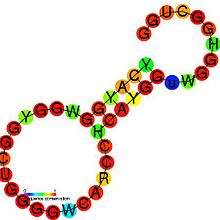| Prion pseudoknot | |
|---|---|
 Predicted
secondary structure and
sequence conservation of Prion_pknot | |
| Identifiers | |
| Symbol | Prion_pknot |
| Rfam | RF00523 |
| Other data | |
| RNA type | Cis-reg |
| Domain(s) | Eukaryota |
| SO | SO:0000233 |
| PDB structures | PDBe |
The prion pseudoknot is predicted RNA pseudoknot structure found in prion protein mRNA. [1] It has been suggested that this element has a possible effect in prion protein translation. [2] The human prion protein gene contains 5 copies of a 24 nucleotide repeat that contains this structure. [2] The number of nucleotide repeats found in an organism may vary from one organism to another. Each species has a set number of nucleotide repeats, but when the organism deviates from this number, mutations in the prion genes may arise. [2] Human individuals that exhibit these mutations may be prone to developing prion diseases, such as Creutzfeldt-Jakob disease. [2]
References
- ^ Wills PR (December 1992). "Potential pseudoknots in the PrP-encoding mRNA". Journal of Theoretical Biology. 159 (4): 523–527. doi: 10.1016/S0022-5193(05)80696-4. PMID 1296103.
- ^ a b c d Barrette I, Poisson G, Gendron P, Major F (February 2001). "Pseudoknots in prion protein mRNAs confirmed by comparative sequence analysis and pattern searching". Nucleic Acids Research. 29 (3): 753–758. doi: 10.1093/nar/29.3.753. PMC 30388. PMID 11160898.
External links
| Prion pseudoknot | |
|---|---|
 Predicted
secondary structure and
sequence conservation of Prion_pknot | |
| Identifiers | |
| Symbol | Prion_pknot |
| Rfam | RF00523 |
| Other data | |
| RNA type | Cis-reg |
| Domain(s) | Eukaryota |
| SO | SO:0000233 |
| PDB structures | PDBe |
The prion pseudoknot is predicted RNA pseudoknot structure found in prion protein mRNA. [1] It has been suggested that this element has a possible effect in prion protein translation. [2] The human prion protein gene contains 5 copies of a 24 nucleotide repeat that contains this structure. [2] The number of nucleotide repeats found in an organism may vary from one organism to another. Each species has a set number of nucleotide repeats, but when the organism deviates from this number, mutations in the prion genes may arise. [2] Human individuals that exhibit these mutations may be prone to developing prion diseases, such as Creutzfeldt-Jakob disease. [2]
References
- ^ Wills PR (December 1992). "Potential pseudoknots in the PrP-encoding mRNA". Journal of Theoretical Biology. 159 (4): 523–527. doi: 10.1016/S0022-5193(05)80696-4. PMID 1296103.
- ^ a b c d Barrette I, Poisson G, Gendron P, Major F (February 2001). "Pseudoknots in prion protein mRNAs confirmed by comparative sequence analysis and pattern searching". Nucleic Acids Research. 29 (3): 753–758. doi: 10.1093/nar/29.3.753. PMC 30388. PMID 11160898.